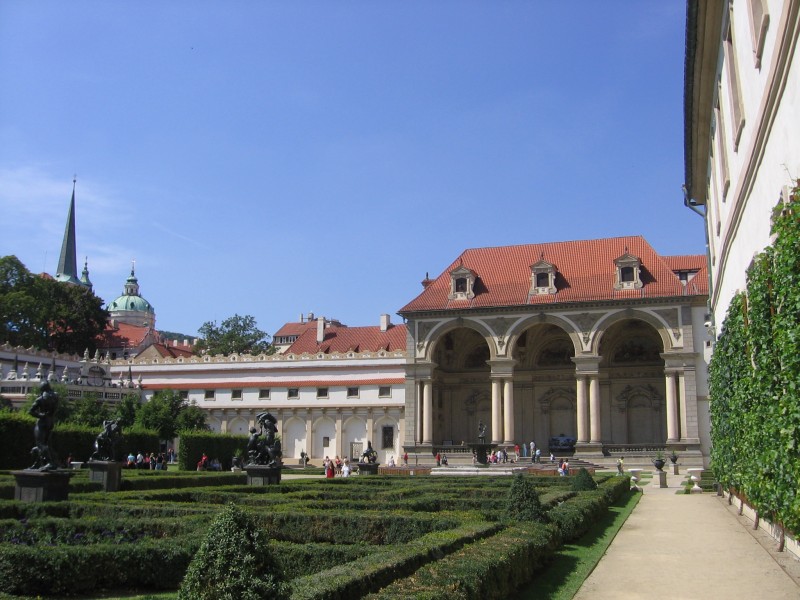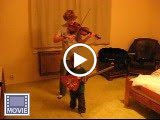Greetings Folks. We just returned from a week long vacation in Moravia (the eastern part of the Czech Republic). Lots to tell, little time to do it. Here are the highlights...
Friday
 What we did:
What we did: Rented car (went wrong way on one way and cussed before I even drove the 1km to get it home (it took me 3 km on the odometer to get here)), crammed all three kids in the back of a
Škoda Fabia, missed turn before we were out of Česke Budějovice, went off the road a little bit trying to leave enough space between us and an oncoming car - problem is there are no shoulders and the ditch is steep - kept in control and learned to be comfortable with less buffer between me and a head on collision (Kristine's hand print is indelibly impressed on the door handle though), carp statue in roundabout in Třeboň, visited romantic castle in UNESCO city
Telč, visited Jewish quarter with narrow streets, Jewish cemetery, and cut stone cathedral in
Třebič (also
UNESCO World Heritage Sites), arrived in
Brno to stay with the Řezač family.
 Most striking:
Most striking: Old headstones with Hebrew inscriptions amid ivy and
forget-me-nots.
Morale: Started the trip with Kristine, Lucy and Silas suffering from colds, Caleb and Peter still drained from biking. Despite this and tight quarters and rain forecast for the entire week, spirits are upbeat.
Road Report: Country roads are narrow, but not too much traffic. Speed limit is 90 km/hr (56 mph) though we rarely attain it because curves are designed for much less. Lots of people passing me on this day.
|
| Jewish Cemetery in Trebic. From 2010-05 |
Saturday

 What we did:
What we did: Went to the limestone caves of the
Moravian Karst, toured Punkva cave complex, saw the
Macocha Abyss from above and below, rode in boats through caves, hiked along trails in wet woodlands, went to crypt of
Capuchin Monks in Brno and saw the mummies and the plaque over them that says "As you are, we once were. As we are, you shall be.", hung out with the Řezač family more.
Funniest: Telling, retelling and continually embellishing the story of why the Macocha ("step-mother") abyss is so named (step-mother threw step-daughter down, but she caught a tree and woodcutters rescued her and threw in the step-mother) because Silas was fixated on the story. Also, needing to explain how the mummies died (Silas slept through this tour) and that they are not mommies. Also, Caleb grumpily saying that he was obviously smiling in the photo below and we didn't need a re-take.
Road Report: Mostly local, well traveled. No problems.
Sunday
|
| Fountain with kolonade in background at Kroměřiž. From 2010-05 |
What we did: Went to church in Brno, found it easier to understand people here, talked with people Kristine knew from her mission, mistakenly did not take signed detour routes, went to nice romantic garden in Kroměřiž where they were filming a movie, went through lots of roundabouts, made it to Štramberk - a beautiful little city on a hillside, visited friends Milada and Jiři Hejkal.
Most striking: the village of Stramberk is a hidden gem, off the international tourist route, truly magical
Most funny: Our Czech grandpa, Jiri, and his constant wisecracks--when he heard the airport had closed for the day because of volcanic ash, he declared that we should start walking home, just make sure we also have our swimsuits along.
Road Report: Signage here is different than in the U.S. Routes may or may not be numbered and even, if they are, the number is on a small sign and not repeated often. Instead signs say where the road goes. With that, however, they may list the next town or the next big town or some random town somewhere along that particular road. Kristine (navigating) would tell me, "take the road that goes to..." and list off three towns to make sure one of them showed up on the sign. Detours were a problem. They may begin suddenly and only be communicated by a small orange sign with an arrow pointing where the detour goes. You may not get a warning about a road closed ahead such that by the time you find out you have to backtrack a km or two. Despite the poor signing, we found it best to follow signed detours because the "well, I'll stay on this road and take the next connecting road" approach doesn't work so well in a place where there is not a grid system for the road network.
Monday
 What we did:
What we did: Worked in Hejkal's garden, climbed around in old quarry and hiked up White Mountain, ate the best fruit dumplings ever, hung out with Hejkal's
Most striking: The village Štramberk was just as cute as a bug's ear.
Most heart-touching: Silas and Jiři goofing around together stealing each others' pillows on the sofa.
Most heartbreaking: Climbing a wet rock face (some 40 feet tall) and seeing Caleb reach the top while his old man chickened out half way up.
Road Report: Just drove back and forth between penzion and Hejkalovi, streets were at a phenomenal slope.
 |
| Us with MIlada and Jiri. From 2010-05 |
Tuesday
What we did: Hiked up to the old castle tower overlooking Štramberk, ate
Štramberske Uši (Stramberk Ears - a circular gingerbread cookie folded around to form something sort of like a funnel, made here since 1241 when the people, taking refuge from the invading Tartars, prayed for help and a rainstorm flooded the Tartar camp. They are in the shape of ears because the invaders would cut off the Christians' ears), hung out with the Hejkal's, got tips on how to make better fruit dumplings, drove to
Polička, ate at a medieval style restaurant.
Most fat on a single platter: My 1000 gram serving of roasted pig's knee was big and bold.
Road Report: I was getting used to driving by now.
Wednesday
What we did: Went to Oldřiš (ancestral home of the Picha's), visited graveyards, Kristine went to the museum and learned about composer
Bohuslav Martinu and the Polička area (including getting a photo of the
kroje (folk dress) from the region, escaped the rain for a while, went hiking to the highest point in the
Vysočina (the highlands region), a place called
Devět Skal (nine rocks) with these cool rock formations atop the hill, took Lucy to urgent care (15 minutes after it closed).
Most striking: Rocks at Devet Skal
Most depressing: Everything for Lucy at this point with her throat hurting to the point of tears.
Road Report: Splendid driving in the hills, the road would actually narrow around trees (i.e. the trunk was half on the road).
Thursday
 What we did:
What we did: Took Lucy to a clinic and got her penicillan for strep throat, visited Jimramov and Konikov (ancestral homeland of the Hloušek's, Great Grannie Annie came over to the States when she was 14), drove home, returned car, went to concert (but left at intermission because Kristine was coughing and Peter was sleeping).
Most striking: Doctor's bill, including medication, was less than $30! How much getting back home felt like home.
Funniest: Black bags under our eyes.
Road Report: Lots of roundabouts again, noticed that they do a lot of spot milling and overlaying on their bituminous roads, makes them look like a patchwork and, on some of the minor roads, made them rough as heck. Work zone signing is not good.
It was fun. Need to rest. No time to rest. The kids and I are leaving for camp in an hour. Kristine is going to Prague for an opera tomorrow.
-Peter



































